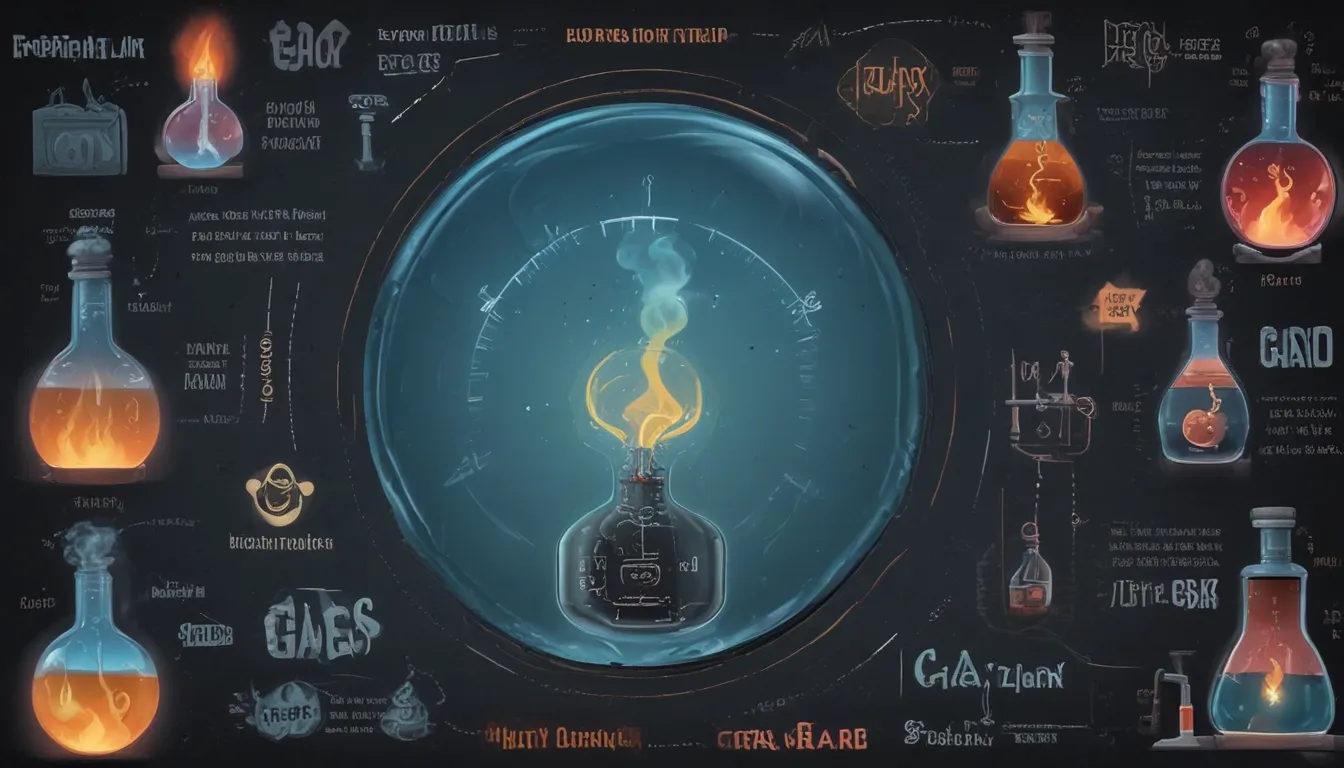A Note About Images: The images used in our articles are for illustration purposes only and may not exactly match the content. They are meant to engage readers, but the text should be relied upon for accurate information.
Gas laws play a vital role in the field of chemistry, offering valuable insights into the behavior and properties of gases. From the principles governing gas behavior to their practical applications in various industries, understanding gas laws is essential for comprehending the world around us. In this article, we will delve into the fascinating world of gas laws and explore eight intriguing facts that will enhance your knowledge and appreciation of this branch of chemistry.
Gas Law Basics: Understanding Gases and Their Behavior
Gas law is a branch of physical chemistry that focuses on the laws and principles governing the behavior of gases. It encompasses various theories and mathematical formulas that help us understand how gases behave under different conditions. By studying gas law principles, scientists have been able to develop a deeper understanding of the physical properties of gases and apply this knowledge in various fields such as chemistry, physics, and engineering.
The Three Fundamental Gas Laws: Boyle’s, Charles’s, and Avogadro’s Laws
- Boyle’s Law: States that at a constant temperature, the pressure of a gas is inversely proportional to its volume.
- Charles’s Law: States that at a constant pressure, the volume of a gas is directly proportional to its temperature.
- Avogadro’s Law: States that equal volumes of gases, at the same temperature and pressure, contain an equal number of molecules.
The Ideal Gas Law: Bringing It All Together
The Ideal Gas Law, represented by the equation PV = nRT, combines Boyle’s Law, Charles’s Law, and Avogadro’s Law into one equation. This powerful equation allows us to calculate the relationship between pressure (P), volume (V), the number of moles of gas (n), the ideal gas constant (R), and the temperature (T). It is an essential tool in various scientific and practical applications.
Gas Law Applications: From Physics to Engineering
Gas law principles find wide applications in fields such as physics, chemistry, engineering, and meteorology. They are crucial in understanding the behavior of gases in chemical reactions, determining the properties of atmospheric gases, designing and analyzing the performance of engines and compressors, and studying the Earth’s climate. Gas law plays a critical role in the development of gas-related technologies and has practical implications in our everyday lives.
Gas Behavior in Real Life: From Hot Air Balloons to Space Exploration
Gas laws help explain phenomena like why hot air balloons float. According to Charles’s Law, as the temperature of a gas increases, its volume expands. In hot air balloons, the air inside the balloon is heated, causing it to expand and float. Gas law principles are also crucial in understanding gas behavior in space exploration and the development of various technologies related to compressed gases and gas pipelines.
Deviations from Ideal Gas Behavior: Understanding Complex Gas Properties
While the Ideal Gas Law assumes ideal gas behavior, certain conditions can cause gases to deviate from this behavior. Factors such as high pressure, low temperature, and the presence of intermolecular forces can affect gas behavior and require more complex equations, such as the Van der Waals equation, to accurately describe their properties. Understanding these deviations is essential in various scientific and technological applications.
Gas Law and the Earth’s Atmosphere: Predicting Atmospheric Phenomena
The study of gas law is vital in understanding and predicting the behavior of gases in the Earth’s atmosphere. It helps scientists analyze and model various atmospheric phenomena, such as the greenhouse effect, air pollution, and the dynamics of weather systems. Gas law principles play a critical role in environmental studies and contribute to our understanding of the Earth’s climate.
Conclusion: Unlocking the Secrets of Gas Behavior
Gas laws offer valuable insights into the behavior of gases and their practical applications in various fields. From Boyle’s law to Charles’s law and Avogadro’s law, these principles provide crucial knowledge that enhances our understanding of the physical world. By exploring the eight fascinating facts about gas law, we gain a deeper appreciation of the importance of these principles in scientific, technological, and environmental contexts.
FAQs: Answering Your Burning Questions About Gas Laws
-
What are the gas laws?
The gas laws are fundamental principles that describe the behavior of gases under varying conditions of pressure, volume, and temperature. -
How do gas laws help us understand the properties of gases?
By establishing relationships between pressure, volume, and temperature, gas laws help quantify and predict the behavior of gases in different scenarios. -
What is Boyle’s law?
Boyle’s law states that the pressure of a gas is inversely proportional to its volume, given that temperature remains constant. -
What is Charles’s law?
Charles’s law states that the volume of a gas is directly proportional to its temperature, provided that pressure remains constant. -
What is Avogadro’s law?
Avogadro’s law states that equal volumes of gases, at the same temperature and pressure, contain an equal number of molecules. -
How are gas laws applied in real life?
Gas laws find practical applications in various fields like gas thermodynamics, chemical engineering, environmental studies, and everyday activities like gas storage and gas-related industries. -
Can gas laws be applied to all gases?
While gas laws provide a good approximation for most gases, they are most accurate for ideal gases that follow all the assumptions of the kinetic theory of gases. -
Are there any exceptions to the gas laws?
Yes, certain gases, particularly at high pressures or low temperatures, may deviate from ideal gas behavior and exhibit exceptions to the gas laws.
Exploring the world of gas laws offers a glimpse into the complex behavior of gases and their crucial role in various scientific and practical applications. By delving into the fascinating facts about gas law, we uncover the mysteries of gas behavior and its extraordinary implications in our understanding of the natural world. Join us on this journey of discovery as we unravel the secrets of gas law and expand our knowledge of the intriguing world of gases.






